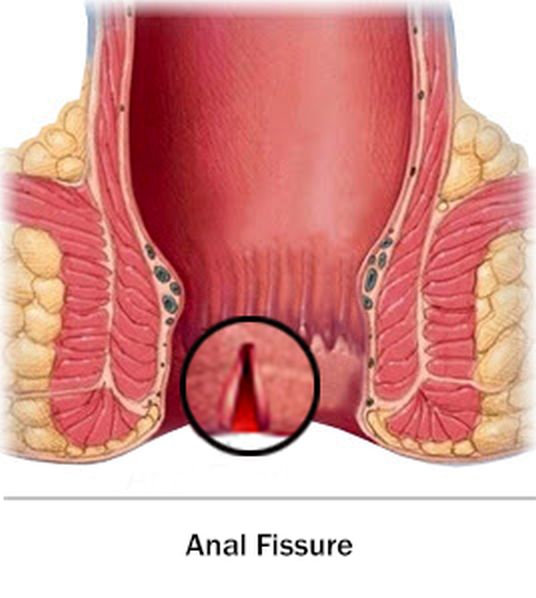Fissure in Rectum

A fissure in the rectum is a painful condition that affects many people worldwide. Also known as an anal fissure, it refers to a small tear or crack in the skin of the anus or the lower part of the rectum. This condition can cause severe discomfort, especially during or after bowel movements. If left untreated, it may lead to chronic pain, bleeding, and other complications.
What Causes Fissure in Rectum?
There are several reasons why a person might develop a rectal fissure. Some of the common causes include:
- Constipation: Straining during bowel movements due to hard, dry stools is one of the most common causes of rectal fissures. The pressure can tear the delicate skin around the anus.
- Diarrhea: Chronic diarrhea can also irritate the skin around the rectum, causing a tear.
- Childbirth: Women may develop rectal fissures after childbirth due to the pressure exerted during delivery.
- Anal Intercourse: This can cause trauma to the skin around the rectum, leading to fissures.
- Inflammatory Bowel Disease (IBD): Conditions like Crohn’s disease and ulcerative colitis can increase the risk of developing fissures in the rectum.
- Other Factors: Certain medical conditions, such as sexually transmitted infections or poor hygiene, may also contribute to the development of fissures.
Symptoms of Rectal Fissure
The symptoms of a rectal fissure can vary in intensity. Common signs include:
- Sharp pain during or after bowel movements.
- Bleeding: You may notice bright red blood on the toilet paper or in the toilet bowl.
- Itching or irritation around the anus.
- A visible tear or crack in the skin of the anus (in some cases).
- Discomfort while sitting or standing for long periods.
Diagnosis
To diagnose a rectal fissure, your doctor will typically perform a physical examination. In some cases, they may need to use a procedure called an anoscopy, which involves using a small tube to examine the inside of the anus and rectum.
If you have a history of inflammatory bowel disease or other medical conditions, your doctor might recommend additional tests to rule out other causes of rectal pain or bleeding.
Treatment Options for Fissure in Rectum
Treatment for a rectal fissure depends on the severity of the condition. In many cases, lifestyle changes and home remedies can help heal the fissure. However, more severe cases may require medical intervention.
1. Non-Surgical Treatment
- Dietary Changes: Eating a high-fiber diet can help soften stools and prevent straining during bowel movements. Staying hydrated is also essential.
- Sitz Baths: Soaking in warm water for 10-15 minutes can help soothe the area and promote healing.
- Topical Medications: Creams or ointments, such as nitroglycerin or hydrocortisone, can help reduce pain, inflammation, and promote healing.
- Stool Softeners: Over-the-counter stool softeners can help prevent constipation and reduce the strain during bowel movements.
2. Surgical Treatment
If conservative treatments don’t work or the fissure becomes chronic, surgery might be necessary. The two most common surgical options for a rectal fissure are:
- Lateral Internal Sphincterotomy (LIS): This is a procedure where a small portion of the muscle around the anus is cut to reduce tension, allowing the fissure to heal.
- Laser Surgery: A more advanced method, laser surgery uses a focused beam of light to remove the fissure and promote healing. This method is less invasive and has a quicker recovery time.
Complications of Untreated Rectal Fissures
If a rectal fissure is left untreated, it can lead to several complications:
- Chronic pain: Fissures that do not heal can result in persistent pain and discomfort.
- Fistulas: In some cases, a fissure can lead to the formation of an anal fistula, which is an abnormal connection between the anus and the skin.
- Recurrent fissures: Chronic fissures can keep recurring, making treatment more complicated.
How to Prevent Rectal Fissures
To prevent rectal fissures, consider the following tips:
- Maintain regular bowel movements: Avoid constipation and diarrhea by eating a healthy diet, drinking plenty of water, and exercising regularly.
- Practice good hygiene: Gently clean the area after bowel movements, but avoid excessive wiping.
- Use a stool softener if necessary, especially if you’re prone to constipation.
Conclusion
A fissure in the rectum can be an extremely uncomfortable and painful condition, but it is treatable with the right care and attention. In most cases, conservative treatments such as dietary changes and topical medications can help heal the fissure. However, if the fissure becomes chronic or severely painful, surgical options like Lateral Internal Sphincterotomy or Laser Surgery can provide long-term relief.
If you’re experiencing rectal pain or have concerns about a fissure, it’s important to consult a qualified specialist. Dr. Ankur Bhanushali, an experienced laser and laparoscopic surgeon in Thane, offers effective treatments for anal fissures and other conditions. With his expertise, you can expect a personalized treatment plan tailored to your specific needs.
📍 Dr. Ankur Bhanushali – Laser & Laparoscopic Surgeon
1st Floor, Aayush Multispecialty Hospital, Marigold Apartment, Almeda Road, Panch Pakhdi, Thane West – 400602
🌐 https://www.drankurbhanushali.com
📧 dr.ankur.bhanushali@gmail.com
📍 GMB: https://maps.app.goo.gl/3Msc7YZqVkV9mQMQ7
🔗 Facebook: https://www.facebook.com/profile.php?id=61573840205822
🔗 Instagram: https://www.instagram.com/surgeon_dr_ankur_bhanushali
🔗 LinkedIn: https://www.linkedin.com/in/dr-ankur-bhanushali-b85aab2a6/
Don’t let rectal fissures control your life. Contact Dr. Ankur Bhanushali today to get personalized care and treatment.
Laparoscopic Cholecystectomy Seamless Surgical Experience Surrounding Tissues Compared Monitor Ensuring Precision Latest Surgical Techniques Highly Effective Procedure Postsurgical Issues Making Patientcentered Approach Gallbladder Diseases Due Potential Complications Patient Wellbeing Make Diet Physical Activity Seasoned Professional Remarkable Reputation Follow Medical Advice Safety Effectiveness Extensive Experience Surgical Instruments Precision Expertise Treating Gallstones Quick Recovery Time Dr Ankur Bhanushali Postoperative Care Bleeding Infection Highest Standards Preferred Choice Preferred Method Expert Patients Leading Experts Smooth Recovery Opposite Nitin Surgeons Skill Minimal Trauma Minimal Risks Faster Return Surgeon Views 086910 33033 Bile Leakage Tiny Camera Wound Care
